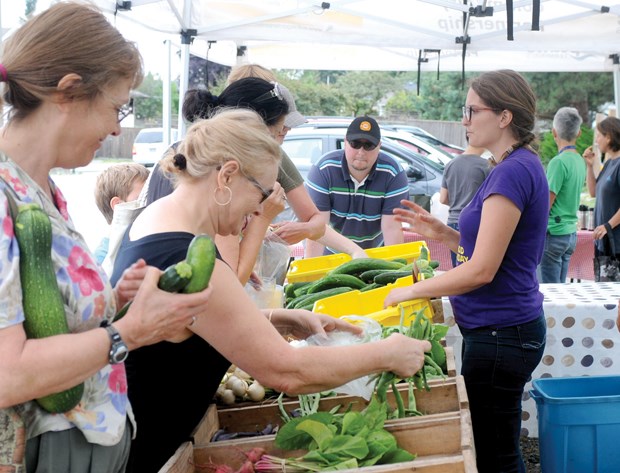Food seems to be the strongest current in this year's flow of ideas coming out of the gardening world.
In community plots, the grocery store and at home, food safety is top of mind for many people. There's concern over GMOs, pesticides and industrial farming practises that put our food supply at risk.
Some people say the hippies have taken over the streets and they are reclaiming land to grow food. Those so-called hippies are actually techno-savvy 20-and 30-year-olds who are concerned about food production that is safe and sustainable. But the healthy food movement is not the exclusive domain of younger generations; people of all ages are concerned about food safety. And many people seem to be putting boots on the ground instead of waiting for policy makers to act.
Sometimes boots on the ground is not enough, often a policy change is needed. A case in point, the Globe and Mail reported that Ontario beekeepers are suing pesticide manufacturers Syngenta and Bayer for $450 million in damages alleging neonicotinoid pesticides or "neonics" have caused bee deaths, driven up costs and reduced honey production. Unfortunately this policy change has to be initiated through litigation with government falling behind the wave of change. The Ontario government has announced a plan to restrict neonics. We'll see how the legislation looks when it's fully revealed.
Most government pesticide regulations around the world have traditionally benefitted industry. The European Union recently enacted a moratorium on neonic pesticide use after pressure from European bee keepers.
To be part of the bee protection solution here at home, visit action2. davidsuzuki.org/neonics and sign the online email petition to request that the federal government ban neonic pesticides across Canada.
Closer to home, the Edible Garden Project at North Shore Neighbourhood House (ediblegardenproject.com) put boots on the ground to achieve some impressive results. In 2014 the EGP grew 23,500 pounds of fresh local produce for people in need. There were 680 residents who volunteered 5,418 hours in gardens and farms on the shore. The
Loutet Farm generated $42,000 in revenue. And 3,600 adults and children were inspired and educated by EGP programs. With a small staff and limited resources the EGP has grown some very positive results for local residents. Not to rest on their laurels, the EGP recently signed an agreement with the North Vancouver School District to start building the Sutherland Schoolyard Market Garden in spring 2015. With results like those, a budget increase would be a good investment.
The North Shore Community Garden Society (northshorecommunitygardensociety.ca) was also busy this year opening the new Lynn Valley Lions Community Garden and nearly completing the Garibaldi Park Community Garden. The North Shore Community Garden Society manages community gardens in the City and Districts of North Vancouver, as well as West Vancouver. The dedicated people at the society also manage the Queen Mary Community Garden, the Charros Community Garden, the North Vancouver City Hall Community Garden, the St. Andrews Community Garden and the Lillooet Park Community Garden. All of the work building and operating those gardens is done by volunteers. Those hard-working, concerned and enthusiastic members of the North Shore community have worked countless hours to create places for people to connect with plants, soil and each other.
Two of the most interesting and controversial gardening styles to re-emerge this year were "biodynamic" and "biocultural" gardening. Biodynamics is a spiritual, ethical and ecological approach to agriculture, food production and nutrition, according to the Biodynamic Association website, biodynamics.com. The system was advocated by Austrian writer, educator and social activist Dr. Rudolf Steiner. Biodynamic farming strives to create a diversified, balanced farm ecosystem to generate health and fertility from within the farm.
Steiner is not without controversy though. He is credited with starting the first Waldorf School, but he was reportedly against disease immunization due to his spirituality.
The term biocultural is credited to Aldo Leopold, considered by some to be the pioneer of wildlife management in the United States. Leopold was a conservationist, forester, philosopher, educator, writer and outdoor enthusiast. His career at the University of Wisconsin and the United States Forest Service during the 1900s and his book, A Sand County Almanac, are benchmark achievements in wildlife management. Biocultural philosophy strives to accommodate the needs of humanity by valuing culture, while protecting and enhancing natural environments. A biocultural landscape is a holistic system of culture and nature that has been shaped by human management over long periods of time.
In gardens and farms, both biodynamic and biocultural philosophies have found a new resonance with modern gardeners and organic farmers. Both systems promote protection of soil and soil organisms and the belief that a holistic approach to growing is sustainable and healthy for people and the planet. Those ideals are needed now more than ever as our politicians and the modern industrial food machine seem indifferent to our concerns about food safety and sustainability.
Todd Major is a journeyman horticulturist, garden designer and builder, teacher and organic advocate. stmajor@shaw.ca



